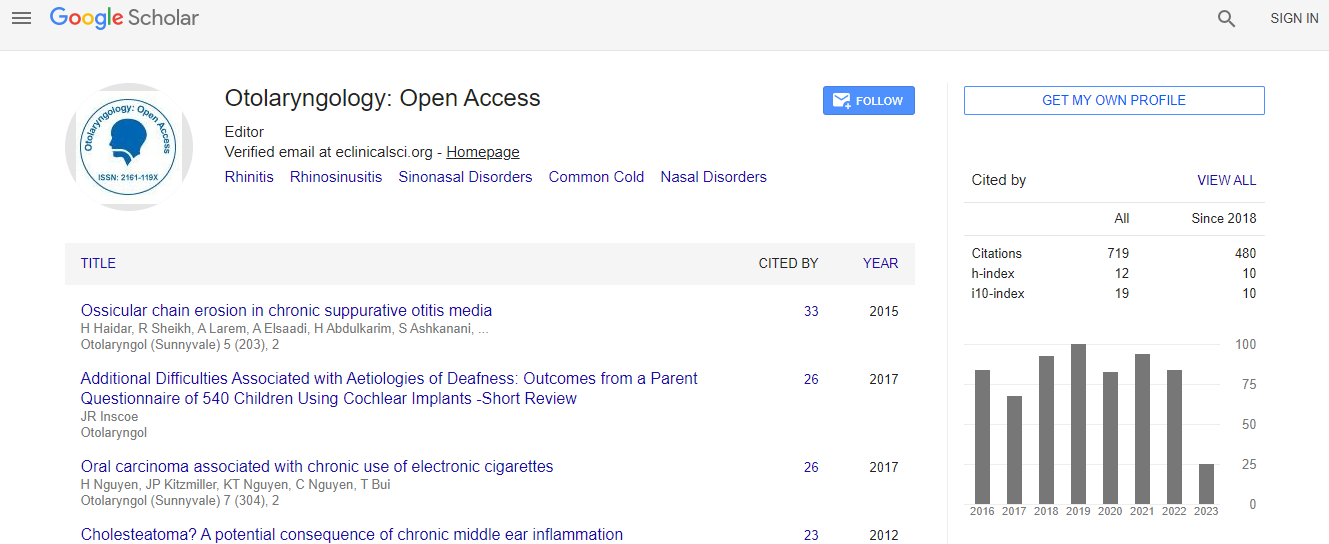Our Group organises 3000+ Global Conferenceseries Events every year across USA, Europe & Asia with support from 1000 more scientific Societies and Publishes 700+ Open Access Journals which contains over 50000 eminent personalities, reputed scientists as editorial board members.
Open Access Journals gaining more Readers and Citations
700 Journals and 15,000,000 Readers Each Journal is getting 25,000+ Readers
Google Scholar citation report
Citations : 925
Otolaryngology: Open Access received 925 citations as per Google Scholar report
Otolaryngology: Open Access peer review process verified at publons
Indexed In
- Index Copernicus
- Google Scholar
- Sherpa Romeo
- Open J Gate
- Genamics JournalSeek
- RefSeek
- Hamdard University
- EBSCO A-Z
- OCLC- WorldCat
- Publons
- Geneva Foundation for Medical Education and Research
- ICMJE
Useful Links
Recommended Journals
Related Subjects
Share This Page
Occupational rhinitis
3rd International Conference and Exhibition on Rhinology & Otology
Lucio Maci and Mario Tavolaro
INAIL, Italy
ScientificTracks Abstracts: Otolaryngology
Abstract
Rhinitis is one of the most common occupational diseases. Occupational rhinitis (OR)is an inflammatory disease of the nose, which is characterized by intermittent or persistent symptoms (nasal congestion, sneezing, rhinorrhea, itching), and/or variable nasal airflow limitation and/or hypersecretion arising out of causes and conditions attributable to a particular work environment and not to stimuli encountered outside the workplace. Work-related rhinitis may be distinguished into: Occupational rhinitis that arises out of causes and conditions attributable to a particular work environment and work-exacerbated rhinitis that is pre-existing or concurrent rhinitis exacerbated by workplace exposures. Since it causes little disability, it is often neglected by affected individuals. However, it is often the preliminary manifestation of a respiratory disorder that could lead to physical complications and socioeconomic disability. The potential causative agents of rhinitis are both numerous and diverse. Respiratory disorders that initially manifest as rhinitis may progress to asthma with continued exposure. Prevention of occupational rhinitis depends upon reducing exposure to allergens and irritants. When rhinitis becomes apparent, removal of the causative agent is essential to stop progression to asthma. According to OSHA, the greatest risk due to exposure to chemical or biological agents are: agriculture, chemical industry, food industry, hairdressing, textile, surface treatment bronzes, the health sector, the collection / treatment of waste, mechanical engineering, printing, cleaning companies, building. This study seeks to draw up an inventory of these diseases and presents the fundamental concepts to know in terms of risk prevention in the workplace.Biography
Email: l.maci@inail.it

 Spanish
Spanish  Chinese
Chinese  Russian
Russian  German
German  French
French  Japanese
Japanese  Portuguese
Portuguese  Hindi
Hindi 
